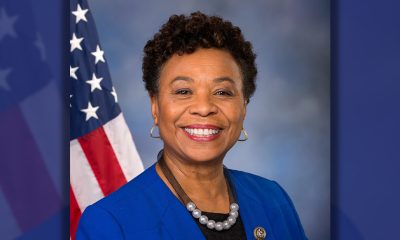Activism
Greater Justice is Coming: Taking on Abusive and Deadly Policing with New DOJ Leadership
And I am not just talking about justice as an idea. I am talking about a Department of Justice that is willing to take on abusive policing and law enforcement agencies that are corrupted by racism.

Thanks to the voters who elected President Joe Biden and Vice President Kamala Harris, we now have a Department of Justice that actually cares about justice.
And I am not just talking about justice as an idea. I am talking about a Department of Justice that is willing to take on abusive policing and law enforcement agencies that are corrupted by racism.
In his first month on the job, U.S. Attorney General Merrick Garland reversed a Trump-era policy that made it harder for the Justice Department to investigate police departments and hold them accountable for violating people’s civil rights.
And he was just getting started. In the past few weeks, the Justice Department has announced that it is starting an investigation of the police departments in Minneapolis—where George Floyd was murdered by former officer Derek Chauvin while other officers watched. The Minnesota AFL-CIO has called the city’s police union a white supremacist-led organization.
The Justice Department has also launched an investigation of policing practices in Louisville, where Breonna Taylor was shot to death in her own home.
These investigations will look at more than those individual killings. This kind of “patterns and practices” investigation looks at the big picture to determine whether and how a law enforcement agency is violating people’s civil rights. They are a way to evaluate—and do something about—the impact that systemic racism has in a police department and the communities it is supposed to serve.
“Patterns and practices” investigations can lead to consent decrees — agreements that require police departments to change the way they operate, with oversight from the Justice Department to make sure change actually happens.
In the past, Justice Department investigations and consent decrees have been important tools for getting violent police behavior under control and changing abusive cultures in out-of-control departments.
When the Trump Administration shut down this kind of investigation, it sent a signal to police departments that the Justice Department would look the other way rather than hold them responsible for misconduct. Of course, Trump himself repeatedly made it clear that he was not opposed to violent policing. In fact, he encouraged it.
Biden has spoken personally about the importance of ending police violence and reimagining public safety. He has called on Congress to pass the imperfect but important George Floyd Justice in Policing Act.
Another good sign was the announcement that the FBI is doing a civil rights investigation of the killing of Andrew Brown, Jr., who was shot in the back of the head by police in Elizabeth City, North Carolina.
All of these are important steps in protecting Americans, especially Black Americans, from abusive policing.
Biden has also spoken out against Republicans’ racist efforts to pass new voting restrictions in states all over the country. Biden has called those efforts “sick” and we can count on his Justice Department to do what they can to challenge voter suppression—even though right-wing justices on the U.S. Supreme Court have greatly weakened the tools that the Voting Rights Act gave the department to prevent Black voters from having their rights denied.
The Justice Department’s Civil Rights Division has just written the Arizona Senate president to raise concerns that a bogus “audit” of ballots from last year’s presidential election that is being conducted by private contractors from the so-called “Stop the Steal” movement could be violating the Voting Rights Act.
There are more signs that we can expect changes at the Justice Department. Associate Attorney General Vanita Gupta, who was recently confirmed by the U.S. Senate, started her career as a civil rights attorney by winning freedom for dozens of mostly Black people wrongly jailed in a small Texas town. And the Senate should soon confirm Kristen Clarke to head the civil rights division, where she started her legal career investigating police conduct, hate crimes, and human trafficking.
Together with Biden and Garland, Gupta and Clarke will save lives, defend civil rights, and give millions of Americans hope that greater justice is coming.
Activism
Oakland Post: Week of April 17 – 23, 2024
The printed Weekly Edition of the Oakland Post: Week of April 17 – 23, 2024

To enlarge your view of this issue, use the slider, magnifying glass icon or full page icon in the lower right corner of the browser window. ![]()
Activism
Oakland Schools Honor Fred Korematsu Day of Civil Liberties
Every Jan. 30, OUSD commemorates the legacy of Fred Korematsu, an Oakland native, a Castlemont High School graduate, and a national symbol of resistance, resilience, and justice. His defiant stand against racial injustice and his unwavering commitment to civil rights continue to inspire the local community and the nation. Tuesday was “Fred Korematsu Day of Civil Liberties and the Constitution” in the state of California and a growing number of states across the country.

By Post Staff
Every Jan. 30, OUSD commemorates the legacy of Fred Korematsu, an Oakland native, a Castlemont High School graduate, and a national symbol of resistance, resilience, and justice.
His defiant stand against racial injustice and his unwavering commitment to civil rights continue to inspire the local community and the nation. Tuesday was “Fred Korematsu Day of Civil Liberties and the Constitution” in the state of California and a growing number of states across the country.
One OUSD school is named in his honor: Fred T. Korematsu Discovery Academy (KDA) elementary in East Oakland.
Several years ago, founding KDA Principal Charles Wilson, in a video interview with anti-hate organization “Not In Our Town,” said, “We chose the name Fred Korematsu because we really felt like the attributes that he showed in his work are things that the children need to learn … that common people can stand up and make differences in a large number of people’s lives.”
Fred Korematsu was born in Oakland on Jan. 30, 1919. His parents ran a floral nursery business, and his upbringing in Oakland shaped his worldview. His belief in the importance of standing up for your rights and the rights of others, regardless of race or background, was the foundation for his activism against racial prejudice and for the rights of Japanese Americans during World War II.
At the start of the war, Korematsu was turned away from enlisting in the National Guard and the Coast Guard because of his race. He trained as a welder, working at the docks in Oakland, but was fired after the bombing of Pearl Harbor in 1941. Fear and prejudice led to federal Executive Order 9066, which forced more than 120,000 Japanese Americans out of their homes and neighborhoods and into remote internment camps.
The 23-year-old Korematsu resisted the order. He underwent cosmetic surgery and assumed a false identity, choosing freedom over unjust imprisonment. His later arrest and conviction sparked a legal battle that would challenge the foundation of civil liberties in America.
Korematsu’s fight culminated in the Supreme Court’s initial ruling against him in 1944. He spent years in a Utah internment camp with his family, followed by time living in Salt Lake City where he was dogged by racism.
In 1976, President Gerald Ford overturned Executive Order 9066. Seven years later, the 9th Circuit Court of Appeals in San Francisco vacated Korematsu’s conviction. He said in court, “I would like to see the government admit that they were wrong and do something about it so this will never happen again to any American citizen of any race, creed, or color.”
Korematsu’s dedication and determination established him as a national icon of civil rights and social justice. He advocated for justice with Rosa Parks. In 1998, President Bill Clinton gave him the Presidential Medal of Freedom saying, “In the long history of our country’s constant search for justice, some names of ordinary citizens stand for millions of souls … To that distinguished list, today we add the name of Fred Korematsu.”
After Sept. 11, 2001, Korematsu spoke out against hatred and discrimination, saying what happened to Japanese Americans should not happen to people of Middle Eastern descent.
Korematsu’s roots in Oakland and his education in OUSD are a source of great pride for the city, according to the school district. His most famous quote, which is on the Korematsu elementary school mural, is as relevant now as ever, “If you have the feeling that something is wrong, don’t be afraid to speak up.”
Activism
WOMEN IMPACTING THE CHURCH AND COMMUNITY
Juanita Matthews, better known as “Sister Teacher,” is a walking Bible scholar. She moved to California from the great state of Arkansas in 1971. Sister Teacher has a passion for teaching. She has been a member of Bible Fellowship Missionary Baptist Church since 1971.

Sister Juanita Matthews
55 Years with Oakland Public School District
The Teacher, Mother, Community Outreach Champion, And Child of God
Juanita Matthews, better known as “Sister Teacher,” is a walking Bible scholar. She moved to California from the great state of Arkansas in 1971. Sister Teacher has a passion for teaching. She has been a member of Bible Fellowship Missionary Baptist Church since 1971. She followed her passion for teaching, and in 1977 became the lead teacher for Adult Class #6. Her motto still today is “Once My Student, Always My Student”.
Beyond her remarkable love for the Lord, Sister Teacher has showcased her love for teaching by working for the Oakland Unified School District for 55 years, all but four of those years spent at Emerson Elementary and Child Development School. She truly cares about her students, making sure they have the tools/supplies needed to learn either at OUSD or Bible Fellowship Missionary Baptist Church.
She’s also had a “Clothes Closet Ministry” for 51 years, making sure her students have sufficient clothing for school. The Clothes Closet Ministry extends past her students, she has been clothing the community for over 50 years as well. She loves the Lord and is a servant on a mission. She is a loving mother to two beautiful children, Sandra and Andre. This is the impact this woman of God has on her church and the community.
-

 Activism4 weeks ago
Activism4 weeks agoOakland Post: Week of March 27 – April 2, 2024
-

 #NNPA BlackPress4 weeks ago
#NNPA BlackPress4 weeks agoCOMMENTARY: D.C. Crime Bill Fails to Address Root Causes of Violence and Incarceration
-

 #NNPA BlackPress4 weeks ago
#NNPA BlackPress4 weeks agoMayor, City Council President React to May 31 Closing of Birmingham-Southern College
-

 #NNPA BlackPress4 weeks ago
#NNPA BlackPress4 weeks agoBeloved Actor and Activist Louis Cameron Gossett Jr. Dies at 87
-

 Community1 week ago
Community1 week agoFinancial Assistance Bill for Descendants of Enslaved Persons to Help Them Purchase, Own, or Maintain a Home
-

 Activism3 weeks ago
Activism3 weeks agoOakland Post: Week of April 3 – 6, 2024
-

 Business1 week ago
Business1 week agoV.P. Kamala Harris: Americans With Criminal Records Will Soon Be Eligible for SBA Loans
-

 Activism2 weeks ago
Activism2 weeks agoOakland Post: Week of April 10 – 16, 2024






















































